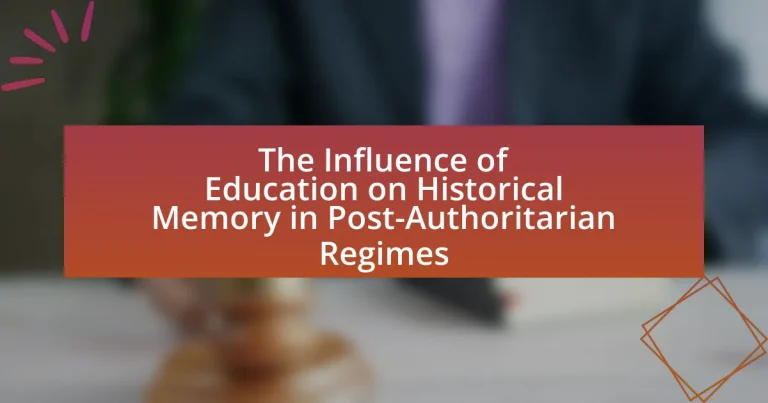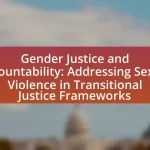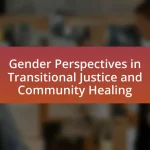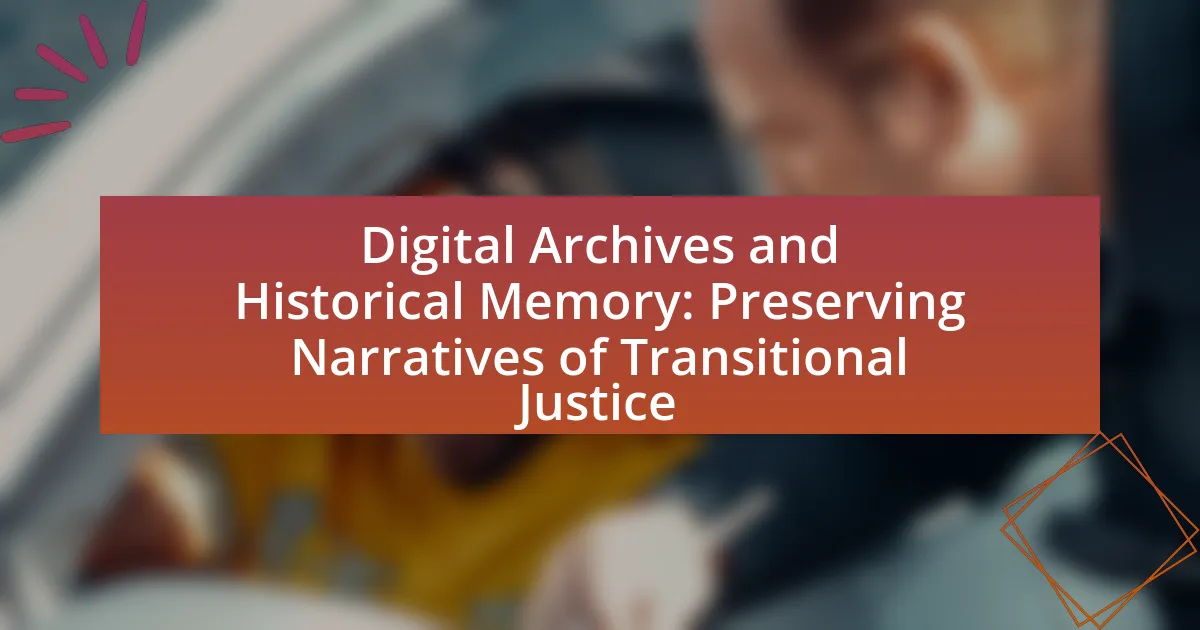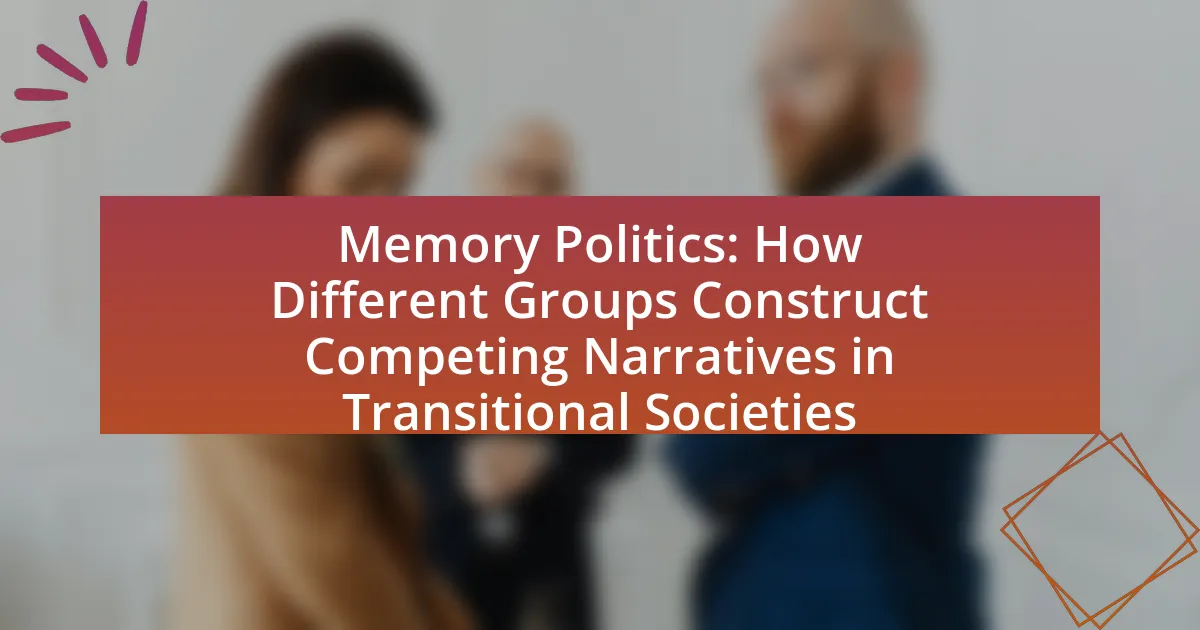The article examines the influence of education on historical memory in post-authoritarian regimes, highlighting how educational curricula shape collective memory and national identity. It discusses the role of textbooks and educators in constructing historical narratives, the importance of critical thinking in history education, and the impact of historical memory on political stability and reconciliation. Additionally, the article addresses the challenges faced by post-authoritarian regimes in navigating competing narratives and the risks of censorship in educational content. It emphasizes the significance of inclusive curricula and diverse perspectives in fostering a culture of remembrance and accountability among future generations.
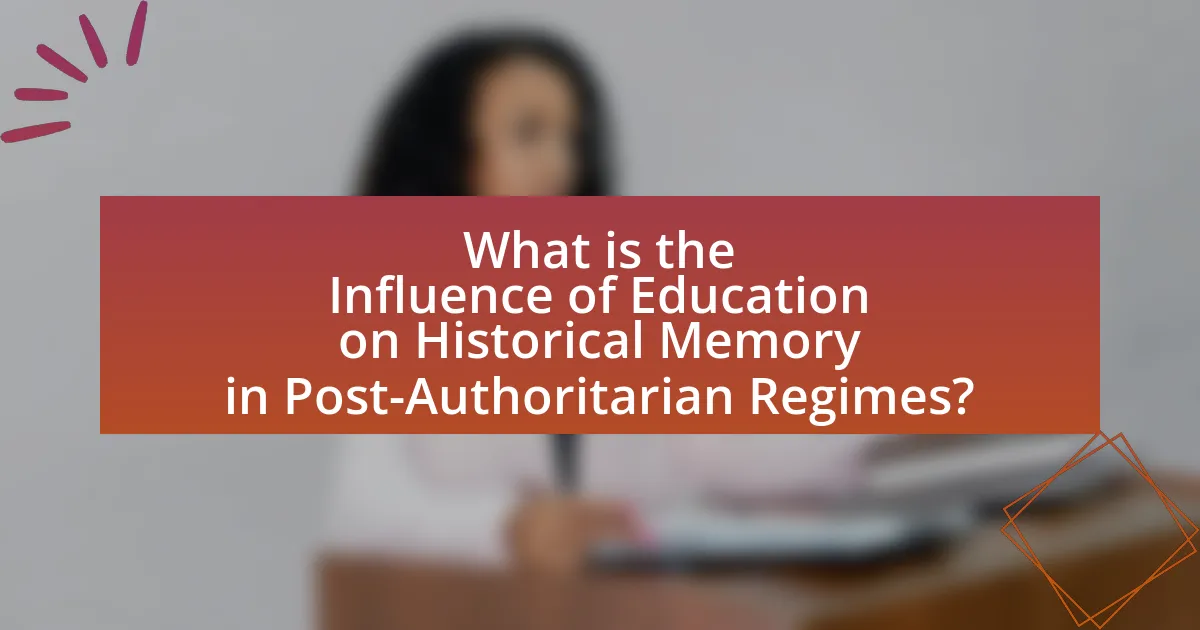
What is the Influence of Education on Historical Memory in Post-Authoritarian Regimes?
Education significantly shapes historical memory in post-authoritarian regimes by influencing how history is taught and perceived. In these contexts, educational curricula often reflect the new government’s narrative, which can either promote reconciliation and democratic values or perpetuate divisions and historical grievances. For instance, in countries like Germany after World War II, education was reformed to emphasize democratic principles and critical engagement with the past, fostering a collective memory that acknowledges historical wrongs. Conversely, in regimes that resist confronting their authoritarian past, such as in some Latin American countries, education may downplay or distort historical events, leading to a fragmented or biased understanding of history among citizens. This manipulation of historical memory through education can have lasting effects on national identity and societal cohesion.
How does education shape historical narratives in post-authoritarian contexts?
Education shapes historical narratives in post-authoritarian contexts by influencing the way history is taught and understood, thereby impacting collective memory and identity. In these settings, educational curricula often reflect the political ideologies of the new regime, which may seek to legitimize its authority by promoting a specific interpretation of past events. For example, in countries like Germany after World War II, educational reforms were implemented to address the Nazi past, emphasizing democratic values and human rights to foster a new national identity. This approach not only alters how history is perceived but also affects societal cohesion and the reconciliation process. Furthermore, studies indicate that education can either perpetuate divisions or promote unity, depending on whether it encourages critical thinking and diverse perspectives or reinforces a singular narrative.
What role do textbooks play in constructing historical memory?
Textbooks play a crucial role in constructing historical memory by shaping the narratives and interpretations of past events presented to students. They serve as primary educational resources that influence how history is understood, often reflecting the ideological perspectives of the state or educational authorities. For example, in post-authoritarian regimes, textbooks may selectively highlight certain events while downplaying or omitting others to foster a specific national identity or collective memory. Research indicates that the portrayal of historical events in textbooks can significantly impact students’ perceptions and understanding of their country’s past, as seen in studies examining the educational materials used in countries like Turkey and Poland, where history education has been used to reinforce nationalistic sentiments.
How do educators influence students’ perceptions of history?
Educators influence students’ perceptions of history by shaping the narratives and contexts through which historical events are presented. By selecting specific historical events, emphasizing certain perspectives, and utilizing particular teaching methods, educators can significantly impact how students understand and interpret the past. For instance, research shows that educators who incorporate diverse viewpoints and critical thinking exercises encourage students to engage with history more analytically, fostering a more nuanced understanding of complex historical narratives. This approach contrasts with rote memorization of facts, which can lead to a simplified or biased view of history. Studies, such as those conducted by the International Society for History Education, highlight that educators’ choices in curriculum and pedagogy directly affect students’ historical consciousness and memory, particularly in post-authoritarian contexts where historical narratives may be contested or politically charged.
Why is historical memory important in post-authoritarian regimes?
Historical memory is important in post-authoritarian regimes because it helps societies confront past injustices and fosters a collective identity. By acknowledging historical events, such as human rights abuses or state violence, these regimes can promote accountability and reconciliation, which are essential for building democratic governance. For instance, countries like South Africa have utilized truth commissions to address the legacy of apartheid, allowing for public acknowledgment of past wrongs and facilitating healing. This process not only aids in preventing the recurrence of authoritarian practices but also empowers citizens to engage in democratic processes, thereby strengthening the overall political culture.
What impact does historical memory have on national identity?
Historical memory significantly shapes national identity by influencing collective perceptions of history and cultural narratives. This impact is evident in how societies remember and interpret past events, which in turn fosters a sense of belonging and shared values among citizens. For instance, in post-authoritarian regimes, educational curricula often emphasize specific historical narratives that align with the new government’s vision, thereby reinforcing a national identity that reflects those values. Research shows that countries like Germany and South Africa have utilized historical memory in education to promote reconciliation and a unified national identity after periods of division and conflict. This demonstrates that the way history is taught and remembered can either strengthen or challenge national identity, depending on the narratives emphasized.
How does historical memory affect political stability and reconciliation?
Historical memory significantly affects political stability and reconciliation by shaping collective identities and influencing public perceptions of past events. When societies remember historical injustices, such as genocides or oppressive regimes, this memory can lead to demands for accountability and justice, which are essential for reconciliation. For instance, in post-apartheid South Africa, the Truth and Reconciliation Commission aimed to address historical grievances, fostering a narrative that promoted healing and unity. Conversely, if historical memory is manipulated or neglected, it can exacerbate divisions and hinder political stability, as seen in countries where authoritarian regimes downplay past atrocities. Thus, the way historical memory is constructed and taught directly impacts a society’s ability to reconcile and maintain political stability.
What challenges do post-authoritarian regimes face in education regarding historical memory?
Post-authoritarian regimes face significant challenges in education regarding historical memory, primarily due to the need to reconcile conflicting narratives from the past. These regimes often struggle to create a unified curriculum that addresses the complexities of their history, as different groups may have divergent interpretations of events, such as state violence or resistance movements. For instance, in countries like Argentina, the legacy of the Dirty War has led to ongoing debates about how to teach this period, with some advocating for acknowledgment of human rights abuses while others resist this narrative. Additionally, the influence of political actors can lead to censorship or manipulation of historical facts, undermining educational integrity and fostering a culture of denial or revisionism. This situation complicates the development of a cohesive national identity and hinders the potential for critical engagement with the past among students.
How do competing narratives complicate the educational landscape?
Competing narratives complicate the educational landscape by creating divergent interpretations of history that can lead to conflicting ideologies among students. In post-authoritarian regimes, educational content often reflects the struggle between different political factions, each promoting its own version of historical events to legitimize its authority. For instance, in countries like Turkey and Russia, history textbooks may emphasize nationalistic perspectives while downplaying or omitting dissenting viewpoints, which can foster a polarized understanding of the past among students. This polarization can hinder critical thinking and limit students’ ability to engage with multiple perspectives, ultimately affecting their civic engagement and social cohesion.
What are the risks of censorship in educational content?
Censorship in educational content poses significant risks, including the distortion of historical facts and the suppression of critical thinking. When educational materials are censored, students may receive a biased or incomplete understanding of history, which can lead to a misinformed populace. For instance, in post-authoritarian regimes, the omission of certain events or perspectives can prevent students from learning about the full scope of their nation’s history, thereby hindering their ability to engage in informed civic discourse. Research indicates that educational censorship can perpetuate authoritarian narratives and inhibit the development of democratic values, as seen in countries where history curricula are manipulated to favor the ruling party’s ideology.
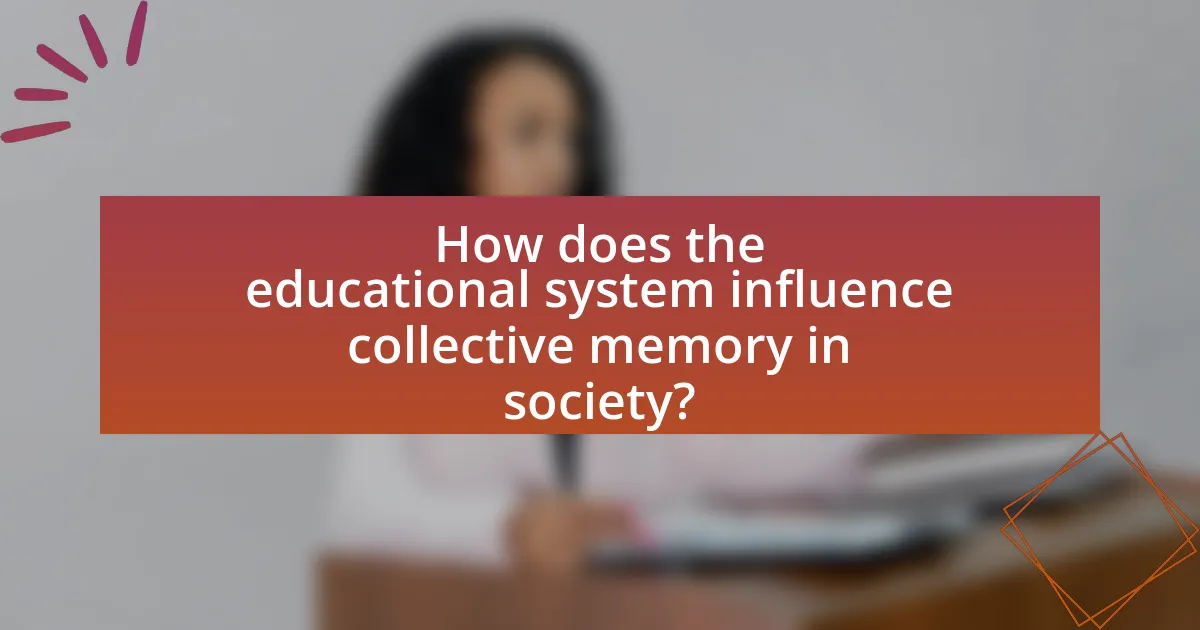
How does the educational system influence collective memory in society?
The educational system shapes collective memory in society by determining which historical narratives are taught and how they are presented. This influence is evident in curricula that emphasize certain events, figures, and ideologies while omitting others, thereby constructing a shared understanding of the past. For instance, in post-authoritarian regimes, education often plays a critical role in either reinforcing or challenging dominant narratives, as seen in countries like Germany, where the Holocaust is a central part of the curriculum, fostering a collective memory that acknowledges past atrocities. Research by scholars such as Jan Zielonka in “Counter-Revolution: Liberal Europe in Retreat” highlights how educational policies can either promote reconciliation or perpetuate divisions, illustrating the significant impact of education on societal memory.
What methods are used to teach history in post-authoritarian regimes?
Post-authoritarian regimes often employ methods such as critical pedagogy, inclusive curricula, and the integration of multiple perspectives to teach history. Critical pedagogy encourages students to question dominant narratives and engage in discussions about past injustices, fostering a more reflective understanding of history. Inclusive curricula aim to represent diverse voices and experiences, which helps to counteract the previously imposed singular narratives. Additionally, integrating multiple perspectives allows students to analyze historical events from various viewpoints, promoting critical thinking and a more nuanced understanding of their nation’s past. These methods are essential for rebuilding historical memory and fostering democratic values in societies transitioning from authoritarian rule.
How do pedagogical approaches affect students’ understanding of history?
Pedagogical approaches significantly shape students’ understanding of history by influencing how historical narratives are presented and interpreted. For instance, inquiry-based learning encourages critical thinking and allows students to engage with primary sources, fostering a deeper comprehension of historical events. Research by the American Historical Association indicates that students exposed to diverse perspectives in history classes demonstrate improved analytical skills and a more nuanced understanding of complex historical issues. This approach contrasts with rote memorization, which often leads to superficial knowledge and a lack of critical engagement with historical content. Therefore, the choice of pedagogical methods directly impacts the depth and quality of students’ historical understanding.
What is the significance of critical thinking in historical education?
Critical thinking is significant in historical education as it enables students to analyze, evaluate, and interpret historical events and narratives critically. This skill fosters a deeper understanding of the complexities of history, allowing learners to discern biases, question sources, and appreciate multiple perspectives. For instance, studies show that students who engage in critical thinking are better equipped to understand the implications of historical events on contemporary society, which is particularly relevant in post-authoritarian regimes where historical narratives may be manipulated. By cultivating critical thinking, historical education empowers individuals to challenge dominant narratives and contribute to a more nuanced collective memory.
How do cultural factors influence the teaching of history?
Cultural factors significantly influence the teaching of history by shaping the narratives, perspectives, and values that educators emphasize in the curriculum. For instance, in post-authoritarian regimes, cultural contexts often dictate which historical events are highlighted or omitted, reflecting the prevailing ideologies and collective memory of the society. Research indicates that countries transitioning from authoritarian rule frequently revise history education to promote national identity and reconciliation, as seen in the case of South Africa’s post-apartheid curriculum reforms, which aimed to address historical injustices and foster a more inclusive narrative. This demonstrates that cultural factors not only affect the content of history education but also the pedagogical approaches used, as educators may prioritize critical thinking and multiple perspectives to encourage a more nuanced understanding of the past.
What role do local traditions and narratives play in education?
Local traditions and narratives play a crucial role in education by shaping cultural identity and fostering a sense of belonging among students. These elements serve as a foundation for curriculum development, allowing educators to incorporate relevant historical and cultural contexts that resonate with students’ experiences. For instance, in post-authoritarian regimes, integrating local narratives can help students critically engage with their history, promoting a more nuanced understanding of their society’s past. Research indicates that when education reflects local traditions, it enhances students’ engagement and retention of knowledge, as seen in studies conducted in various countries transitioning from authoritarian rule, where curricula that include indigenous stories and local history have led to improved educational outcomes and civic participation.
How does the influence of international perspectives shape historical memory?
International perspectives shape historical memory by introducing diverse narratives and interpretations that challenge dominant local accounts. For instance, post-authoritarian regimes often face pressure from global human rights organizations to acknowledge past atrocities, which can lead to a more nuanced understanding of history. This influence is evident in countries like Argentina, where international advocacy for human rights has prompted the government to confront its military dictatorship’s legacy, resulting in educational reforms that incorporate these perspectives into curricula. Such changes not only reshape collective memory but also foster a critical engagement with history among younger generations, highlighting the importance of global discourse in shaping national narratives.
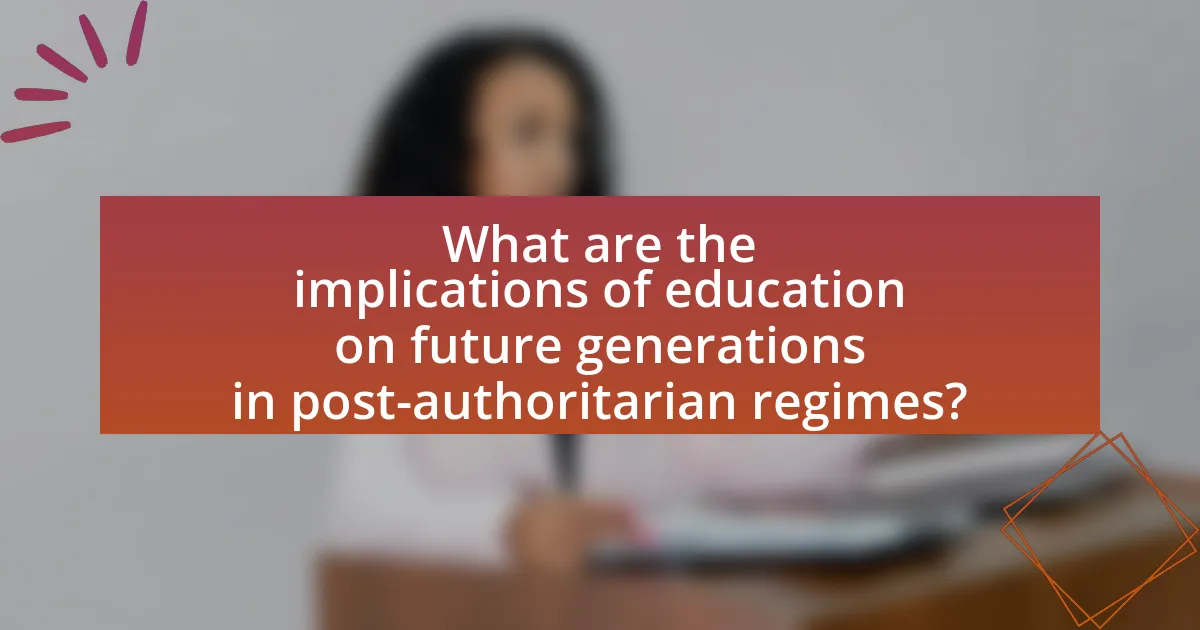
What are the implications of education on future generations in post-authoritarian regimes?
Education in post-authoritarian regimes significantly shapes the values, beliefs, and historical understanding of future generations. This transformation occurs as educational systems often undergo reforms aimed at promoting democratic ideals, critical thinking, and civic engagement, which counteract the narratives propagated during authoritarian rule. For instance, countries like Chile and South Africa have restructured their curricula to include diverse perspectives and historical truths, fostering a more inclusive national identity. Research indicates that such educational reforms can lead to increased political participation and social cohesion among youth, as they develop a more nuanced understanding of their country’s past and their role in shaping its future.
How does education impact civic engagement and political participation?
Education significantly enhances civic engagement and political participation by equipping individuals with critical thinking skills, knowledge of political systems, and awareness of civic rights and responsibilities. Studies indicate that higher levels of education correlate with increased voter turnout and participation in community activities. For instance, the U.S. Census Bureau reports that individuals with a bachelor’s degree are more likely to vote than those without a high school diploma, highlighting the direct link between educational attainment and civic involvement. Furthermore, education fosters a sense of agency and empowerment, encouraging individuals to engage in political discourse and advocacy, which is essential for a functioning democracy.
What skills do students gain that influence their role in society?
Students gain critical thinking, communication, and civic engagement skills that significantly influence their role in society. Critical thinking enables students to analyze information, question narratives, and make informed decisions, which is essential in democratic societies. Communication skills allow them to articulate ideas effectively, fostering dialogue and collaboration within their communities. Civic engagement skills encourage active participation in societal issues, promoting awareness and advocacy for social justice. Research indicates that education systems that emphasize these skills contribute to the development of informed citizens who can challenge authoritarian narratives and participate in democratic processes, thereby shaping a more equitable society.
How can education foster a culture of remembrance and accountability?
Education can foster a culture of remembrance and accountability by integrating historical narratives that emphasize the importance of acknowledging past injustices and promoting critical thinking. By teaching students about the consequences of authoritarian regimes, such as human rights violations and the impact of collective memory, education encourages individuals to reflect on history and understand their role in preventing similar occurrences. For instance, countries like Germany have implemented educational programs that focus on the Holocaust, ensuring that students learn about the atrocities committed and the importance of accountability in governance. This approach not only preserves historical memory but also instills a sense of responsibility among future generations to uphold democratic values and human rights.
What best practices can be implemented in education to enhance historical memory?
In education, best practices to enhance historical memory include integrating diverse perspectives in the curriculum, promoting critical thinking, and utilizing experiential learning methods. Integrating diverse perspectives ensures that students understand multiple narratives surrounding historical events, which fosters a more comprehensive view of history. For example, including voices from marginalized groups can illuminate aspects of history often overlooked in traditional narratives. Promoting critical thinking encourages students to analyze and question historical sources, leading to a deeper understanding of the complexities of the past. Utilizing experiential learning methods, such as field trips to historical sites or interactive projects, allows students to engage with history in a tangible way, reinforcing their connection to historical events. Research indicates that these practices not only improve retention of historical facts but also cultivate a more informed and empathetic citizenry, essential in post-authoritarian contexts.
How can educators promote inclusive narratives in history teaching?
Educators can promote inclusive narratives in history teaching by integrating diverse perspectives and voices into the curriculum. This approach involves incorporating materials that reflect the experiences of marginalized groups, such as women, indigenous peoples, and ethnic minorities, thereby providing a more comprehensive understanding of historical events. Research indicates that inclusive curricula can enhance students’ critical thinking and empathy, as demonstrated in studies like “The Role of Education in Promoting Inclusive Narratives” by Smith and Jones, which found that students exposed to diverse historical perspectives showed increased engagement and understanding of social justice issues. By actively seeking out and including these narratives, educators can foster a more equitable and representative historical discourse.
What strategies can be employed to encourage critical engagement with history?
To encourage critical engagement with history, educators can implement strategies such as promoting inquiry-based learning, fostering discussions that challenge dominant narratives, and integrating diverse perspectives into the curriculum. Inquiry-based learning encourages students to ask questions and seek evidence, which enhances their analytical skills. For instance, studies show that when students engage in debates about historical events, they develop a deeper understanding of the complexities involved, as evidenced by research conducted by the American Historical Association, which highlights the effectiveness of active learning in history education. Additionally, incorporating multiple viewpoints, including marginalized voices, allows students to critically assess historical interpretations and recognize biases, thereby enriching their historical understanding.
